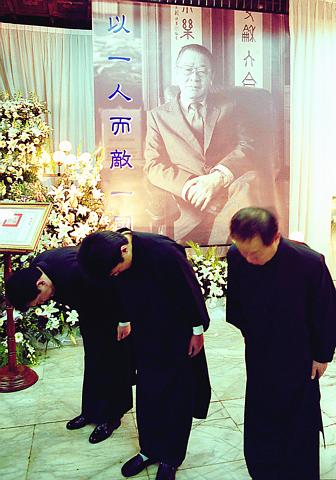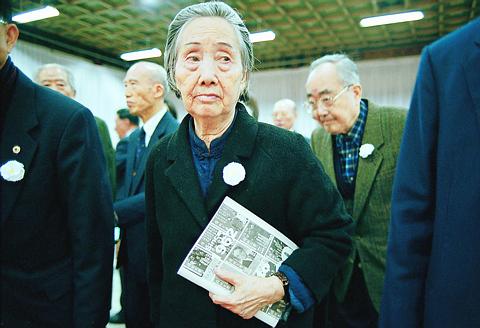Liu Shao-tang (劉紹唐), founder and publisher of the monthly magazine Biographical Literature (傳記文學), was eulogized yesterday during a funeral service in Taipei. Liu died on Feb. 10 of lung cancer, aged 80.
Historians that came to the service said Liu's efforts in collecting first-hand historical records on Chinese history from 1911 to the present day helped fill the gaps in official accounts of the same period.
"Liu has been dubbed as the head of the `unofficial Academia Historica,' and his contribution to the study of modern Chinese history is of paramount importance," said Chang Yu-fa (張玉法), a research fellow at the Institute of Modern History at Academic Sinica.

PHOTO: CHEN CHENG-CHANG, TAIPEI TIMES
Pouring rains and Chinese classical music greeted long lines of mourners who attended the service, held in the Chinghsing Hall at Taipei's First Funeral Parlor yesterday morning. Among those attending were officials, retired officials, scholars, and Huang's relatives and friends.
Two of Liu's old friends -- Liang Su-jung (梁肅戎), former Legislative Yuan speaker, and Pok Shau-fu (卜少夫), a veteran newsman -- gave their eulogies. Also invited to express his thoughts on Liu was Taipei Mayor Ma Ying-jeou (馬英九).
"I didn't see this occasion merely as an official engagement in which I as the Mayor of Taipei came to pay tribute to the founder of a monthly magazine published in Taipei. I am here to pay my respects to someone who has devoted his life to the development of culture," said Ma.

PHOTO: CHEN CHENG-CHANG, TAIPEI TIMES
In addition to praising Liu's devotion to the monthly magazine for the past 38 years, Ma expressed his own personal fondness of the publication.
"During a time when extracurricular reading materials were relatively scarce here in Taiwan, the magazine gave me an opportunity to probe the life histories of important figures in modern Chinese history. It served as the best of learning materials for me," he added.
Liu gained fame long before founding the magazine in 1962. In 1951, he published a book titled Out of Red China (紅色中國的叛徒) in which he recounted his experiences as a reporter at the Chinese Communist Party's (CCP) Xinhua News Agency, and his days in the CCP's People's Liberation Army (PLA).
Liu also described why it was he decided to leave the Communist Party after one year within the organization.
Since publication of the book, Liu was seen as a well-known anti-communist writer.
The US Information Service (USIS) later translated the book into more than ten languages as anti-communist propaganda, during a time when containment of communism was a mainstream doctrine in the West.
For historians, however, it is Liu's endeavor to found the magazine, focusing on biographic writing, that made him a key figure in preserving a record of modern Chinese history.
For this, Liu won a 1996 National Literary Award (國家文藝獎), conferred by the Council for Cultural Affairs.
Liu founded the magazine in Taiwan in June 1962, at the age of 40. It coincided with an era when publishing contemporary history could land an author in jail.
Until this year, the magazine has been published uninterruptedly for a total of 452 issues, relying on a single editor, no advertising revenue, and no subsidies. Cultural critics often described the magazine's longevity as "a miracle" in Taiwan's publishing industry.
Chang said Liu's decision to launch the magazine was influenced by Hu Shih (胡適), the great thinker. "Hu was an advocate of biographic writing. He believed that everybody should write their own stories to serve as eyewitnesses to their times. And Liu carried out Hu's dream," Chang said.
The majority of the articles released in the magazine were first-hand materials because many were accounts of personal experiences, chang said.
"These publications are very helpful to historians focusing on modern Chinese history," he said. "But for the existence of this magazine, I believe many of the precious historical accounts would have disappeared for good."
But historians also admit that the publication had its dark days -- Liu started the journal recording events and dissecting the actions of important figures, back during the time when Taiwan was still under martial law.
Chen San-ching (陳三井), a research fellow at the Institute of Modern History at Academic Sinica, gave a vivid example.
"When the magazine touched upon sensitive political issues, such as how many women Sun Yat-sen (孫中山), founder of the Republic of China, had in his life, the authorities were concerned, fingering Liu as a tool of the communists," Chen said.
But the magazine stands out as a pinnacle of achievement among those of its kind in Taiwan and China, Chen said. "In terms of content, quality and accuracy, the magazine is an unprecedented accomplishment."
On March 30, a panel discussion on the contribution of the magazine to the study of modern Chinese history will be held at the mayor's former residence, now a venue for cultural events.
According to the organizers of the event, a one-month exhibition on Liu's life will be held concurrently at the same venue.

‘FORM OF PROTEST’: The German Institute Taipei said it was ‘shocked’ to see Nazi symbolism used in connection with political aims as it condemned the incident Sung Chien-liang (宋建樑), who led efforts to recall Democratic Progressive Party (DPP) Legislator Lee Kun-cheng (李坤城), was released on bail of NT$80,000 yesterday amid an outcry over a Nazi armband he wore to questioning the night before. Sung arrived at the New Taipei City District Prosecutors’ Office for questioning in a recall petition forgery case on Tuesday night wearing a red armband bearing a swastika, carrying a copy of Adolf Hitler’s Mein Kampf and giving a Nazi salute. Sung left the building at 1:15am without the armband and apparently covering the book with a coat. This is a serious international scandal and Chinese

PERSONAL DATA: The implicated KMT members allegedly compiled their petitions by copying names from party lists without the consent of the people concerned Judicial authorities searched six locations yesterday and questioned six people, including one elderly Chinese Nationalist Party (KMT) member and five KMT Youth League associates, about alleged signature forgery and fraud relating to their recall efforts against two Democratic Progressive Party (DPP) legislators. After launching a probe into alleged signature forgery and related fraud in the KMT’s recall effort, prosecutors received a number of complaints, including about one petition that had 1,748 signatures of voters whose family members said they had already passed away, and also voters who said they did not approve the use of their name, Taipei Deputy Chief Prosecutor

A US Marine Corps regiment equipped with Naval Strike Missiles (NSM) is set to participate in the upcoming Balikatan 25 exercise in the Luzon Strait, marking the system’s first-ever deployment in the Philippines. US and Philippine officials have separately confirmed that the Navy Marine Expeditionary Ship Interdiction System (NMESIS) — the mobile launch platform for the Naval Strike Missile — would take part in the joint exercise. The missiles are being deployed to “a strategic first island chain chokepoint” in the waters between Taiwan proper and the Philippines, US-based Naval News reported. “The Luzon Strait and Bashi Channel represent a critical access

COUNTERINTELLIGENCE TRAINING: The ministry said 87.5 percent of the apprehended Chinese agents were reported by service members they tried to lure into becoming spies Taiwanese organized crime, illegal money lenders, temples and civic groups are complicit in Beijing’s infiltration of the armed forces, the Ministry of National Defense (MND) said in a report yesterday. Retired service members who had been turned to Beijing’s cause mainly relied on those channels to infiltrate the Taiwanese military, according to the report to be submitted to lawmakers ahead of tomorrow’s hearing on Chinese espionage in the military. Chinese intelligence typically used blackmail, Internet-based communications, bribery or debts to loan sharks to leverage active service personnel to do its bidding, it said. China’s main goals are to collect intelligence, and develop a